Search Results
Showing results 41 to 60 of 68
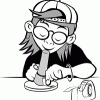
Bubbularium: See the Colors in Bubbles
Source Institutions
With little more than a flashlight, a straw, and a plastic lid, make an observatory so you can see the amazing colors in bubbles.

The Old White Sheet Trick: Light and Insect Behavior
Source Institutions
In this outdoor, nighttime activity, learners gather around a brightly lit, white surface and study the behavior of nocturnal animals attracted to the light, particularly night fliers.
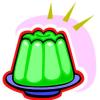
Shimmering Lenses
Source Institutions
In this activity, learners use Jell-O to explore lenses. Learners cut Jell-O into convex and concave lens shapes and examine how light exits each lens in a darkened room.
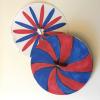
Opti-Top
Source Institutions
In this activity, learners will create an optical illusion top. Learners will explore color mixing, physics and design through this activity.
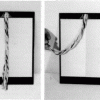
Gray Step
Source Institutions
In this activity, learners discover that it's difficult to distinguish between two different shades of gray when they aren't separated by a boundary.
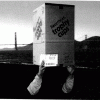
Personal Pinhole Theater
Source Institutions
Have you ever heard of a camera without a lens? In this activity, learners create a pinhole camera out of simple materials. They'll see the world in a whole new way: upside down and backwards!
Glowing Tonic
Source Institutions
In this sunny day activity, learners compare how a cup of water and a cup of tonic water reflect or refract light in the sun.
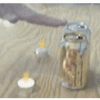
Phantom Phlame
Source Institutions
In this trick, hold your hand over a burning candle without getting burned, by reflecting and transmitting the light of two candles. This activity is best suited as a demonstration.
Diffraction Between Wax Blocks
Source Institutions
In this optics activity, learners explore diffraction by adding wax blocks to a ripple tank. The wedge-shaped blocks act as obstacles that the wave must bend around.
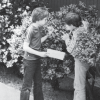
Plants Around a Building
Source Institutions
In this outdoor activity, learners discover how the environment around a building affects the growth of plants.
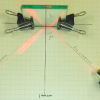
Mirror, Mirror
Source Institutions
In this activity, learners test the Law of Reflection based on experimental evidence. Learners produce raw data and explanations based on their data: pencil tracings of incident and reflection rays.
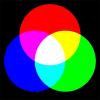
Three Colors of Light
Source Institutions
Have fun with additive mixing! Observe what happens when the three primary colors of light--red, green and blue--are mixed together, resulting in white light.
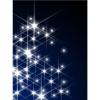
Hot Air
Source Institutions
In this activity, learners set up an experiment to investigate the effects of hot air on the path of a laser beam.
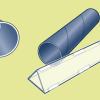
Kaleid-o-mania
Source Institutions
In this hands-on activity, learners build their own kaleidoscopes and explore how light can reflect of off surfaces such as mirrors, to produce beautiful patterns.
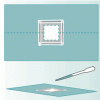
Tools of Magnification
Source Institutions
In this activity related to microbes, learners use water drops and hand lenses to begin the exploration of magnification. This activity also introduces learners to the microscope.
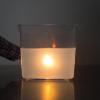
Blue Sky
Source Institutions
In this optics activity, learners explore why the sky is blue and the sunset is red, using a simple setup comprising a transparent plastic box, water, and powdered milk.
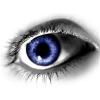
How Our Environment Affects Color Vision
Source Institutions
In this lab (Activity #1 on page), learners explore how we see color.

What does Color have to do with Cooling?
Source Institutions
In this demonstration/experiment, learners discover that different colors and materials (metals, fabrics, paints) radiate different amounts of energy and therefore, cool at different rates.
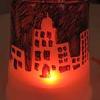
Night Lights
Source Institutions
In this activity, learners create night lights using a plastic cup, programmable PICO Cricket, tri-color LED, and sensor.
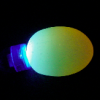
Why is the Sky Purple?
Source Institutions
This simple hands-on activity demonstrates why the sky appears blue on a sunny day and red during sunrise and sunset.
